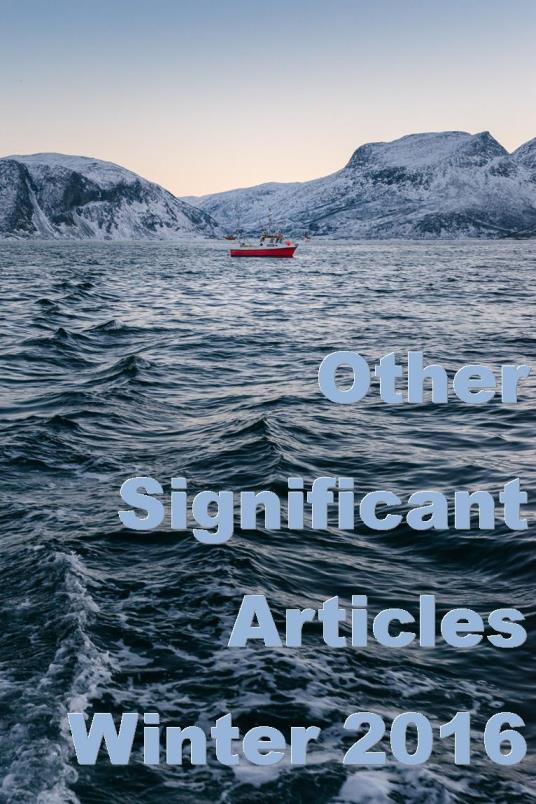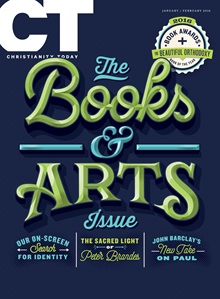Winter 2016: Other Significant Articles

Lee Grady, “How to Leave an Unhealthy Church” Fire In My Bones (Nov 25, 2015).
 “What’s So Dangerous About Grace?: Biblical scholar John Barclay explains why Paul shocked his religious peers—and reminds us how radical the gospel really is.” Christianity Today (Jan-Feb 2016).
“What’s So Dangerous About Grace?: Biblical scholar John Barclay explains why Paul shocked his religious peers—and reminds us how radical the gospel really is.” Christianity Today (Jan-Feb 2016).
NT theologian John M. G. Barclay speaks with Wesley Hill about grace and his book, Paul and the Gift (Eerdmans, 2105). He says that the theological conversation about the New Perspective on Paul has become polarizing, getting some things wrong and some things right. “The New Perspective has tried to rediscover the original historical context in which Paul himself was ministering. … I’m also trying to unearth the root of Paul’s theology. The New Perspective has said that the theme of grace wasn’t at the core of Paul’s theology. The New Perspective also believes that Paul’s theology was formed in his historical context, in and for his mission among non-Jews. As a result, the New Perspective has focused more on the social dimensions of Paul’s thought, and has sidelined grace. But grace really was at the center of his theology.”
“While there is no prior worth for receiving the gift of grace, God expects something in return. Paul expects those who receive the Spirit to be transformed by the Spirit and to walk in the Spirit.”
“[T]here are no limits to the reach of God’s grace. Both Paul and Jesus stood alongside people who were not at all respectable. In doing so, they took big social risks. God’s grace operates beyond our norms of what is civil, proper, or fair. And it challenges our hidden prejudices. Why do we distrust immigrants, stigmatize the poor, or disdain certain socioeconomic groups? Why are we tempted to think that people who do not have a spouse or a job, or who do not have a physique matching cultural ideals, have somehow failed? Whose values are we applying?”
Roger E. Olson, “Narrative Theology Explained” Patheos (January 15, 2016).
Olson offers his “revised and updated admittedly concise description of ‘narrative theology’ and why this approach to Scripture and theology has no need of ‘inerrancy.’”
Craig S. Keener, “My Real Life Hosea Story: Even when my wife was unfaithful, I continued to experience the faithful love of God” Christianity Today (January 15, 2016).
For the first summary paragraph, Craig Keener wrote, “Most people know me as a New Testament scholar. To keep my reading of Scripture balanced, however, I do most of my devotions from the Old Testament. Indeed, I have encountered God especially deeply in prophetic books such as Hosea and Jeremiah, where God laments over his people who have wandered far from him. God intended for his people to have an intimate relationship with him, a covenant relationship that the Bible compares with marriage.”
Catherine Clark Kroeger, “My Story, My Mission, My Hope” God’s Word to Women (February 3, 2016).
The late Dr. Cathie Kroeger shares her story and her reasons for standing against violence and abuse towards women and advocating egalitarianism. With an introduction by Susan Stubbs Hyatt.
Philip Jenkins, “History and the Limits of the Climate Consensus: Acknowledging the science of global warming does not require accepting that it is immune to criticism” The American Conservative (January 21, 2016).
While he does not disagree with the global warming consensus, Christian historian Philip Jenkins says that a stable, pre-industrial global temperature is a myth.
I began my career as a historian of the century following 1660, an era of harsh climatic conditions that often affected political and cultural history. Some periods in particular, especially the years around 1680 and 1740, stand out as uniquely stressful. Extreme cold led to crop failures and revolts, social crises and apocalyptic movements, high mortality and epidemics, but it also spawned religious revivals and experimentation. If you write history without taking account of such extreme conditions, you are missing a lot of the story.
“An Interview with Candy Gunther Brown” PCPJ (February 18, 2016).
“How does science relate to the supernatural?”
“On Dying and Reckoning with the Prosperity Gospel: How church historian Kate Bowler’s cancer diagnosis brought her face-to-face with the beauty and terror of the popular movement” Christianity Today (February 23, 2016).
This interview by Morgan Lee is introduced: “Kate Bowler is a Canadian professor at Duke Divinity School who researches the prosperity gospel movement. She’s also 35, a wife and mother, and critically ill with cancer.”
David Garrison, “Muslim movements to Jesus”.
Doug Lucas of Team Expansion wonders if this is the most encouraging talk of the decade. Watch David Garrison, author of A Wind in the House of Islam: How God Is Drawing Muslims Around the World to Faith in Jesus Christ (2014), speaking about the history of movements made up of Muslims deciding to follow Jesus and what is happening today. More movements exist today than any time in history. This recording was made at the Finishing the Task 2015 conference held in December of 2015 at Saddleback Church.
Jo Maym “David Suchet: faith, the Bible and doubt” Church of England Newspaper (December 19, 2015).
British actor David Suchet discusses how he prepared for reading the New International Version of the Bible, and how receiving a letter about a woman healed of blindness helped motivate him to pursue the recording project.
Lee Grady, “5 Ways to Pray for the Muslim World” Fire In My Bones (March 30, 2015).
Category: Winter 2016


